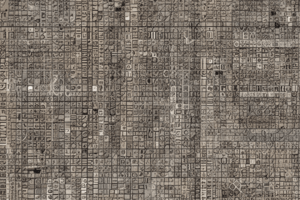Podcast
Questions and Answers
What is the formula to find the nth term of an arithmetic sequence?
What is the formula to find the nth term of an arithmetic sequence?
- a_n = a + (n + 1)d
- a_n = a - (n - 1)d
- a_n = a + nd
- a_n = a + (n - 1)d (correct)
What is the formula for the sum of the first n terms of an arithmetic sequence?
What is the formula for the sum of the first n terms of an arithmetic sequence?
- S_n = (n/2)(2a - (n - 1)d)
- S_n = (n/2)(a - (n - 1)d)
- S_n = (n/2)(a + (n - 1)d)
- S_n = (n/2)(2a + (n - 1)d) (correct)
What is the condition for an infinite geometric series to converge?
What is the condition for an infinite geometric series to converge?
- |r| > 1
- |r| < 1 (correct)
- r = 0
- |r| = 1
Which of the following is an application of infinite geometric series?
Which of the following is an application of infinite geometric series?
What is the formula for the sum of an infinite geometric series?
What is the formula for the sum of an infinite geometric series?
Study Notes
Arithmetic Sequence
- A sequence of numbers in which each term is obtained by adding a fixed constant to the previous term.
- General form:
a, a + d, a + 2d, a + 3d, ..., whereais the first term anddis the common difference. - Formula to find the
n-th term:a_n = a + (n - 1)d - Formula to find the sum of the first
nterms:S_n = (n/2)(2a + (n - 1)d)
Infinite Geometric Series
- A series of the form
a + ar + ar^2 + ar^3 + ..., whereais the first term andris the common ratio. - Converges if
|r| < 1, and diverges if|r| ≥ 1. - Formula for the sum of an infinite geometric series:
S = a / (1 - r), where|r| < 1. - The sum of an infinite geometric series is finite and exists only if the common ratio is between -1 and 1.
- Applications of infinite geometric series include:
- Modeling population growth and decay
- Calculating interest rates and investments
- Analyzing electronic circuits
Arithmetic Sequence
- An arithmetic sequence is a sequence of numbers where each term is obtained by adding a fixed constant to the previous term.
- The general form of an arithmetic sequence is
a, a + d, a + 2d, a + 3d,..., whereais the first term anddis the common difference. - The formula to find the
n-th term of an arithmetic sequence isa_n = a + (n - 1)d. - The formula to find the sum of the first
nterms of an arithmetic sequence isS_n = (n/2)(2a + (n - 1)d).
Infinite Geometric Series
- An infinite geometric series is a series of the form
a + ar + ar^2 + ar^3 +..., whereais the first term andris the common ratio. - An infinite geometric series converges if
|r| < 1, and diverges if|r| ≥ 1. - The formula for the sum of an infinite geometric series is
S = a / (1 - r), where|r| < 1. - The sum of an infinite geometric series is finite and exists only if the common ratio is between -1 and 1.
- Infinite geometric series have applications in:
- Modeling population growth and decay
- Calculating interest rates and investments
- Analyzing electronic circuits
Studying That Suits You
Use AI to generate personalized quizzes and flashcards to suit your learning preferences.
Description
Learn about arithmetic sequences and infinite geometric series, including their formulas and applications. Practice problems and quizzes to test your understanding.




